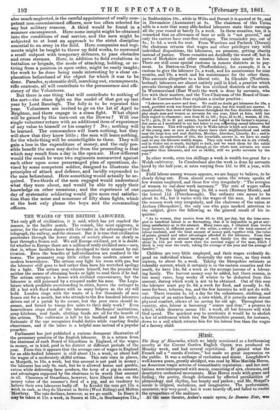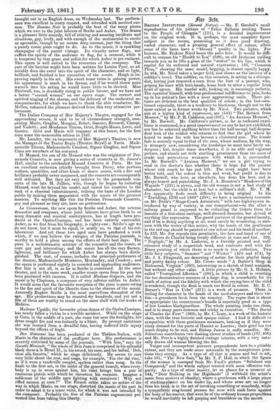Zeit.
The Song of' Hiawatha, which we lately mentioned as a forthcoming novelty at the Covent Garden English Opera, was produced on Monday week, and had several repetitions. It gained what the French call a " succes d'estime," but made no great impression on the public. It was a mélange of recitation and music. LongfeBow's well-known poem, greatly abridged, was read by Miss Matilda Heron, an American tragic actress of transatlantic reputation : and her reci- tations were interspersed with music, consisting of airs, choruses, and descriptive orchestral movements. Miss Heron reads with grace and feeling; the poetry, though deformed by affected peculiarities of Phraseology and rhythm, has beauty and pathos ; and Mr. Stcepel's music is original, melodious, and imaginative. The performance, moreover, was very good; but it went heavily off, and failed to excite the sympathies of the audience.
At the same theatre,‘Anber's comic opera; Le Bonito Noir, was
brought out in an English dress, on Wednesday last. The perform- ance was excellent in every respect, and attended with merited suc- cess. The Domino Noir is probably the best of the many pieces which we owe to the joint labours of Scribe and Auber. The drama is a pleasant little comedy, full of stirring and amusing incidents and situations, gay, lively, and with enough of the sentimental to excite an agreeable, though by no means deep interest, just the thing that a purely 'comic piece ought to do. As to the music, it is sparkling champagne of the purest vintage. Its vivacity never flags, nor suffers the spirits of the audience to flag, for a moment, while it is tempered by that grace and polish for which Auber is pre-eminent. This • opera is well suited to the resources of the company. The part of theheroine might have been written for Louisa Pyne, so ad- mirably does she enter into the spirit of the character, and so light, brilliant, and finished is her execution of the music. Haigh is im- proving rapidly in his art. His sweet tenor voice is gaining power, his appearance is much in his favour, and if he would throw more warmth into his acting he would leave little to be desired. Miss Thirlwall, too, is decidedly rising in public favour, and we have not a better "second woman" on our opera stage. The correct and spirited singing of the chorus, and the delicacy of the orchestral ac- companiments, for which we have to thank the able conductor, Mr. Mellon, enhanced the pleasure derived from this very attractive per- formance.
The Italian Company of Her Majesty's Theatre, engaged for the approaching season, Is said to be of extraordinary strength, com- prising Mario, Giuglini, Mongini, Belart, Gassier, Everardi, Ciampi, and Vialetti ; and Mesdames Titiens, Grisi, Borghi-Mamo, Lotti, and Gassier. Grisi and Mario will reappear at this house, for the first time since the memorable schism in 1847.
Mr. Lumley-, the ex-impresario of Her Majesty's Theatre, is now the Manager of the Teatro Regio (Theatre Royal) at Turin. Made- moiselle tritiens, Mademoiselle Casaloni, Signor Giuglini, and Signor Cline are.members of his company. M. Musard, the son of the Musard who was the originator of Pro- wenn' de Concerts, is now giving a series of concerts at St. James's Hall, similar to the celebrated Musard Concerts at Paris. He has an excellent orchestra (chiefly brought from Paris), who perform waltzes, quadrilles, and other kinds of dance music, with a fire and brilliancy probably never surpassed, and the concerts are consequently well attended. But they are very inferior to the promenade con- certs of the late M. Jullien, who, though he began by imitating Mdsard, went far beyond his model, and raised his concerts to the rank of a classical entertainment, refining the taste of the London public by making them acquainted with the music of the greatest masters. To anything lige this the Parisian Promenade Concerts, gay and pleasant as they are, have no pretensions.
La Circassienne, the new opera by Scribe and Auber, the veteran dramatist and composer, whose joint labours have given birth to so many dramatic and musical masterpieces, has at length been pro- duced at the Opera-Comictue, and has been entirely successful. Auber, as we find from his biography, is eighty-one ; Scribe's age we do not know, but it must be equal., or nearly so, to that of his col- laborateur. And yet these two aged men have produced a work which, if we may believe the eulogies of the Parisian journals, is i worthy to hold a place among the efforts of their best days: The piece s a melodramatic mixture of the romantic and the comic, at once gay and interesting; and the music has all the easy fluency, lightness, and brilliancy for which Auber has always been distin- guished. The cast, of course, includes the principal performers of the theatre, Mademoiselle Montrose, Montaubry, and Couderc ; and the opera is performed nightly to crowded and applauding audiences. But this is not all, in as far as Scribe is concerned. At the same theatre, and in the same week, another comic opera from his pen has been produced with success. It is called .Aradame Gregoire, and the music is by Clapisson, a composer of very inferior calibre to Auber. It would seem that the favourite reception of the piece is more owing to the fire and spirit of the libretto than to the charms of the music. Assuredly Eugene Scribe is the most marvellous dramatist of the age. His productions may be counted *by hundreds, and yet not a few of them are worthy- to stand on the same shelf with the works of Moliere.
Madame TJgalde, the favourite prima donna of the Opera-Comique, has nearly fallen a victim to a temble accident. While on the stage at Caen, in the middle of a part, she came too near the footlights, her dress caught fire and was instantly, in a blaze. By prompt assistance she was rescued from a dreadful fate, having suffered little injury beyond the effects of fright.
Don Giovanni has been produced at the Theritre-Italien, with Mario in the character of the profligate hero. His performance is severely criticized by some of the journals. "With him," says the Gazette lrfuiicale, "the whole of Don AMR is comprised in his splendid black dress ir la Henri II., in his sword, his cane, and his ballad, 'Deh, vieni alla finestra,' which he sings deliciously. He seems to care very little about the,rest, and sings, for example, Fin che dal vino,' as if it were a vaudeville couplet, spoken rather than sung. In the finale to the first act, in the midst of the general tumult, When every- body is up. in arms against him, his valet brings him a pair of enormous pistols with which lie threatens his enemies. Imagine a nobleman of the middle ages fighting with revolvers! Why not rifled cannon at once ?" The Reach critic takes no notice of the way in which Mario, on our stage, distorted the music of his part in order to adapt it to a tenor voice, for which it was not intended by the composer. Probably the fear of the Parisian cognoscenti pre- vented him from taking this liberty.































 Previous page
Previous page